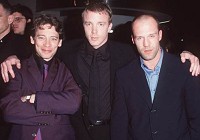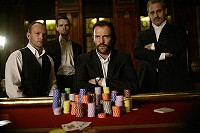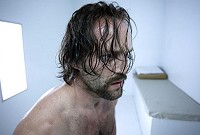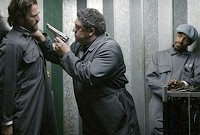 Into the Mind of Revolver
Into the Mind of Revolver
 Ritchie keeps talking...
Ritchie keeps talking...
So you donít fit the stereotype of the dictatorial filmmaker?
Ritchie: If somebody has a better idea than me, Iíll take it if it surpasses what we have on the page because at the end of the day, itís me that takes the credit anyway! Iíve been working with lots of these guys for ten years now and Iíve become very aware of how much the team has to do with the creative process. Iím not under too much of an illusion of how smart or un-smart I am because filmmaking ultimately is about teamwork. I enjoy the process and Iíve usually done quite a lot of preparation before I arrive on set so Iím not a touchy filmmaker and Iím not an anxiety-ridden filmmaker, at least while Iím shooting the film. If you enjoy things, it tends to quell your negative traits.
Youíve also worked with Jason Statham on almost all your filmsÖ
Ritchie: Apart from the fact that I donít like him, donít trust him and have no respect for him as a chess player, Jason and I work quite well together. Actually, Jason forced me into using him. He threatened me with violence. The rest of the cast I have more affection for. Andrť was a pleasure to work with. In fact, 95% of the people in my films have been nothing less than a pleasure to work with. That goes for Jason, too. I like him and because I like him, itís much easier to work with him. Heís a very capable actor and he embodies what I want to see when I go to the cinema. Iíve been a big fan of Ray Liottaís for a long time and been desperate to use him in something. He wasnít very keen about being put into spandex pants and Speedos but once he got into the spirit of things it was hard to get him out of them.
What freedom do you give the actors to improvise?
Ritchie: I like to think that weíve got a plan, so letís stick to it. That said, once weíve stuck to it, weíre allowed as much improvisation as anyone cares to indulge themselves in. Youíd be surprised how little indulging one wants to undertake once youíve stuck to the plan. We always have a take thatís ďone for funĒ, so once youíve got what you need, you can do what you like. Something does occasionally pop out of that tree. Iím always open to ideas.
Does chance exist?
Ritchie: I donít believe chance exists, no. I donít know whether it does but personally I donít believe in it. Either thereís order in the universe or thereís chaos. Either everything is predetermined or, by the definition of free choice, you can determine it but thereís still no element of chance. Or thereís the other way of thinking, that itís all chaos and thereís absolutely no order and itís all chance. You either subscribe to one or the other. I subscribe to the idea that there is order although it may look like total chaos, but Iíve no idea if Iím right. In the film, Jakeís niece is a good example. She represents innocence and I liked the idea that she could ride a roller-coaster thatís collapsing all around but still land on a bed of cotton wool against all the odds because innocence protects her. There are infinite examples, of course, where innocence is not nurtured or cared for, but it all comes back to chance. Do you believe in chance or not? Do you believe that the universe is fair or unfair?
Whatís the role of violence in your films?
Ritchie: My approach to violence is that if itís pertinent, if thatís the kind of movie youíre making, then it has a purpose. Thereís quite a lot of violence in this film but I like to think that it serves the story, that it illustrates the point weíre trying to convey. Jason doesnít take his shirt off and beat anyone up, which would seem to be the kind of thing that Jason would do as heís quite good at it, because it didnít seem to serve his character and the narrative. I quite like the idea of Jason keeping his shirt on anyway.
Does Jason still do all his own stunts?
Ritchie: Jasonís game to do all his own stunts. I wouldnít allow him to because if he broke his leg or something Iíd be screwed for eight weeks. Heís as game as a train to throw himself down flights of stairs. I am not so enthusiastic, so I threw other people down the stairs.
Is there any limit to how violent a scene can be?
Ritchie: I think thereís a natural system in your own head about how much violence the scene warrants. Itís not an intellectual process, itís an instinctive process. I like to think itís not violence for the sake of violence and in this particular film, itís actually violence for the annihilation of violence. Itís about not letting the internal enemy, the real enemy, have his way because the more he does the stronger he becomes. The filmís about the devastating results that can manifest from the internal enemy being unbridled and allowed to unleash chaos.
As a writer-director, which aspect of filmmaking do you enjoy most?
Ritchie: You get a different kick out of all aspects of filmmaking. I suppose directing on set is the most fun because itís a good crack and you feel youíre on the battlefield whereas writing is a fairly solitary undertaking. Itís not easy to strap yourself down to a desk and bash on a keyboard when you know you can direct lots of films, because directing films is fun and interactive and gregarious. Writing isnít. Itís very solitary and you need to exercise a great deal of discipline to do it. I think itís in the exercise of disciplining yourself to do it that the most profit lies. I love dialogue and I suppose writing dialogue is certainly the most fun.
Of the various formulas that make up the rules of the game, do you have a favorite?
Ritchie: I suspect my favorite line is, ďYou can only get smarter by playing a smarter opponent.Ē My next one would be, ďThe greatest enemy will hide in the last place you would ever look.Ē The third one would be, ďThe harder the battle, the sweeter the victory.Ē My fourth would be, ďAlways protect your investmentĒ which would become, ďAlways protect your investment whether itís in your interest or not.Ē
Besides Jakeís name, there is an abundance of symbols in the film. What purpose do they serve?
Ritchie: I think itís fun that films have depth. Iíve left a whole snail trail of clues and symbols for those who care to indulge themselves. But is it integral to your enjoyment of the film? I think not. There are simply different levels that the film tries to serve.
Chess is a prime exampleÖ
Ritchie: The rules in chess are consistent with the rules of all cons. I like the idea that the characters could all be different pieces on a chess board. I think we all embody the attributes of pawns, bishops, knights and castles, kings and queens. Itís just a question of do we decide to be a pawn or do we decide to be a queen. I didnít choose to be the latter particularly but there are different aspects to our personality and nature that the chess board represents, which is maybe why chess is such a popular and ancient game. Iím a very bad chess player, by the way. Jason Statham has probably been blowing his own trumpet about what a qualified chess player he is. In fact, heís an appalling chess player.
And the fact that the face-off between Jake and himself, his internal enemy, takes place on the 13th floor?
Ritchie: The elevator starts at 32 and stops between 14 and 12. In America, buildings still donít have a 13th floor. 13ís a curious number. Quite how it got its unpopular reputation is a mystery and one I would quite like to have solved. Mythologically, itís the luckiest number, itís the number of liberation. From a point of view of Jakeís incarceration, what better place to liberate yourself than floor 13, which doesnít even exist in an elevator. It just seemed like the perfect environment in which to meet your demon. A number that doesnít exist that is also the number of liberation.
That scene is one of the most impressive in the whole movieÖ
Ritchie: Itís my favorite scene in the film and I actually shot it three times. It initially had four lines written for it. When we got in there, we spent two hours messing around, trying to draw as much as I could out of Jason. I realized weíd got into something that was very interesting and in the end I could probably have filmed 45 minutes of him screaming at himself in there.
The film opens with Jake Green getting out of jail. Would you say that it ends with him enjoying another kind of liberation?
Ritchie: The film starts off with a jailbreak and ends with a jailbreak because all the skulduggery going on inside his head didnít allow him to know he was still incarcerated. Thatís what the film is about, the ultimate jailbreak and the radical actions one needs to undertake to liberate oneself from this jail. It tells the story of the skulduggery and trickery and head-trickery that accompanies Jake on his journey, and the seemingly unlikely actions our hero has to undertake to break out of his jail.


Dexter Fletcher, Guy Ritchie and Jason Statham at the premiere for Lock, Stock and Two Smoking Barrels in 1998.





